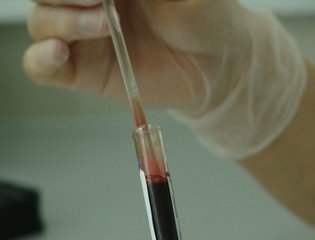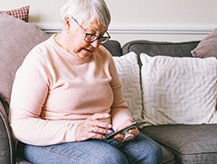Ovarian cancer diagnosis
At what stage is ovarian cancer usually diagnosed?
More than 75% of affected women are diagnosed at an advanced stage. At the earlier stages, symptoms can be subtle and can often be mistaken for other issues, and symptoms of late-stage disease can still be nonspecific. There’s also no reliable screening tool so it’s vital everyone knows the symptoms so they can get checked out if they experience them.
Ovarian cancer is diagnosed at one of four stages. The stage describes how big a cancer is and how far the cancer has spread inside the body – the higher the stage the further the cancer has progressed.
At what age are people with ovarian cancer usually diagnosed?
The risk of developing ovarian cancer increases with age, with more than half of all cases in the UK in women aged 65 and over. While older females are more likely to be diagnosed with ovarian cancer, younger women can develop it too.
You may have a higher chance of getting ovarian cancer if you:
- Inherited a faulty gene, such as BRCA genes or those linked to Lynch syndrome (see below)
- Had breast cancer or bowel cancer
- Had radiotherapy treatment for a previous cancer
- Have endometriosis or diabetes
- Started your periods at a young age or went through the menopause late (over 55), or have not had a baby – because these factors may mean you’ve released more eggs (ovulate more)
- Have never used any hormonal contraception, such as the pill or an implant
- Are taking hormone replacement therapy (HRT)
- Are overweight
- Smoke
It’s still possible to get ovarian cancer even if you’ve had your ovaries removed. This is because ovarian cancer can also affect your fallopian tubes, or the lining inside your tummy (peritoneum).
Genetic testing and ovarian cancer
If you have used our risk tool and suspect your family history puts you at increased risk of cancer, we strongly recommend that you make an appointment to see your GP to discuss your situation further. You can read more on what to expect at the GP, the genetics clinic and managing the possible results of testing here.
Misdiagnosis of ovarian cancer
Other chronic conditions including irritable bowel syndrome and the menopause share symptoms with ovarian cancer such as bloating. This crossover means that there is a real danger of misdiagnosing the disease and often a far more serious diagnosis is overlooked.
I’ve just been diagnosed with ovarian cancer, now what?
If you've been told you have ovarian cancer, you usually need more tests. These, along with the tests you've already had, will help the specialists find out the size of the cancer and how far it's spread (called the stage) to help inform the best course of treatment for you.
Can a smear test detect ovarian cancer?
No, a smear test does not check for ovarian cancer. The only gynaecologic cancer a smear test screens for is cervical cancer. There is still no national screening programme for ovarian cancer in the UK.
Can a pregnancy test detect ovarian cancer?
No. A home pregnancy test is in no way a valid or reliable route to diagnosing ovarian cancer. The incidences of a positive result being due to ovarian cancer, as opposed to an actual pregnancy, are minimal. The only way to accurately detect ovarian cancer is to have a CA125 blood test and an ultrasound scan, followed by a biopsy for diagnosis.





